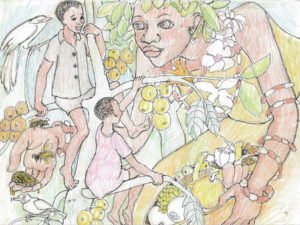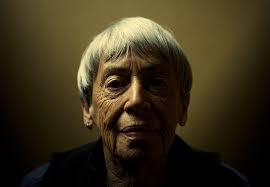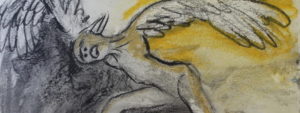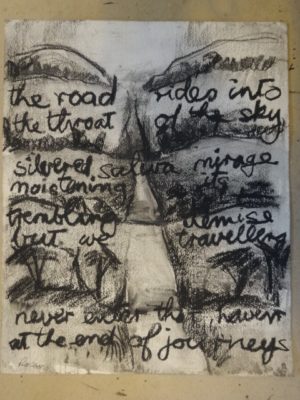“For magic consists in this, the true naming of a thing.”
― Ursula K. Le Guin, A Wizard of Earthsea
Words and editing

Makemba, the Wise Woman of the Garden with Chipo and Chibwe in the Rainforest. There is a Rainbird, a Honeyguide, and bees in the fig tree. Ruth Hartley
I’m engaged in a major rewrite of my children’s book The Drought Witch. It’s an exciting task expanding a children’s picture book into a novel for 9 to13-year-olds but the interesting work is in the editing and paring down of my words to make them work well. This major commitment is keeping me fully occupied at the moment. I love the way Ursula Le Guin describes writing so she can speak for what I aspire to do. I have been mentored by Sandra Glover, a successful children’s author and consultant arranged by Cornerstones Literary Agency. It’s a good experience and my book is taking shape well.
Chipo and Chibwe, school-children, make a perilous journey through the heart of modern and magical Africa to save their parents’ farm from drought and climate change.
A writer is a person who uses words carefully

Ursula K. Le Guin
“A writer is a person who cares what words mean, what they say, how they say it. Writers know words are their way towards truth and freedom, and so they use them with care, with thought, with fear, with delight. By using words well they strengthen their souls. Story-tellers and poets spend their lives learning that skill and art of using words well. And their words make the souls of their readers stronger, brighter, deeper.”
― Ursula K. Le Guin
Le Guin is an inspiration to me – a political and thoughtful writer. There are many other writers I love too.
Word communicate, name, explain, words are weapons and arbiters

The struggle to fly – one of a series of drawings inspired by the Icarus myth. Ruth Hartley.
“Only in silence the word,
Only in dark the light,
Only in dying life:
Bright the hawk’s flight
On the empty sky.”
—The Creation of Éa
― Ursula K. Le Guin
Words are powerful
What is it to be wordless?

Illustrated verse from a poem The Road by Ruth Hartley
Wordless , adjective – speechless, silent, or mute, not put into words; unexpressed.
Related words – incoherent, imperceptible, muffled, bashful, silent, speechless, mum, reticent, restrained, mute, dumb, dazed, amazed, unspoken, indirect, implied, implicit, nameless, latent, tacit.
2 Comments on “Words, the power of words and the work of wordsmiths”
I echo your statement : “the interesting work is in the editing and paring down of my words to make them work well”. So many authors moan about editing, but to me it’s the best part of writing and your words here about words themselves bear that out.
Hi Jessica – it’s good to meet somebody else who enjoys it as much as I do. I still find that I need another editor’s eyes on my work though. I miss out on noticing my personal quirks and tricks which can disfigure writing. Do you write a particular genre that you feel needs that care or do you think all genres need the same scrutiny?